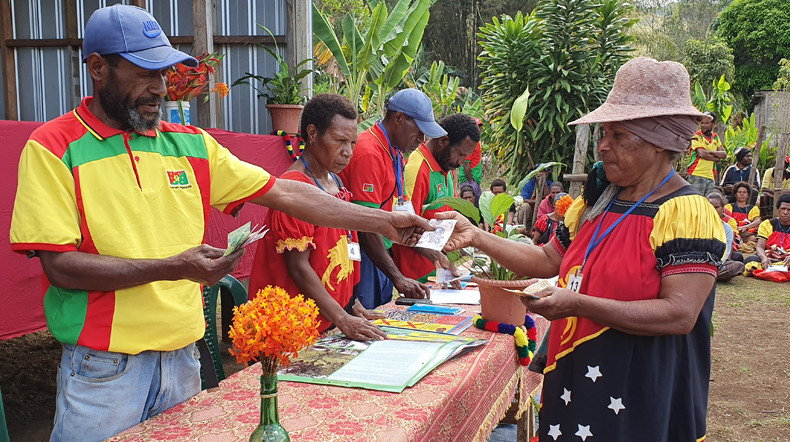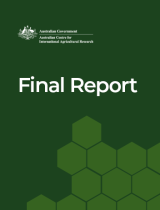A sweet deal for PNG coffee growers

A new way to remove a sticky layer from around pre-processed coffee beans is helping farmers in Papua New Guinea (PNG) produce and sell high-quality coffee.
Coffee production is the primary source of household income for many highlands communities, but production and quality have decreased over recent years partly due to a lack of post-harvesting knowledge.
An ACIAR-funded project run through Curtin University is introducing technology to help coffee growers process their harvest with ease, producing better quality and more valuable coffee in the process.
Coffee beans are the seed of a coffee cherry, which has six different layers that need to be removed to reach the coffee beans underneath. One of these layers, called the mucilage, is sticky and difficult to remove.
Farmers in the Eastern Highlands have traditionally used fermentation to remove the mucilage, however, this process leaves little room for error and limits the quality of the coffee. On a local coffee farm in Bena, researchers worked with farmers to test a special mill—a demucilager—that uses friction rather than fermentation to remove the mucilage.
ACIAR project leader, Professor George Curry from Curtin University, said the results were impressive. ‘The project has trained group members to operate the demucilager and conduct float tests to remove poor quality beans. They are now producing very good quality coffee.’
Professor Curry added that the research that led to this innovation investigated the socio-economic constraints on smallholder production and coffee quality. Labour supply constraints within the household and a reluctance to use hired labour, were major factors limiting the time for quality processing. The mill increased the efficiency of labour and dramatically improved the quality of the coffee beans.
New Guinea Highlands Coffee Exports (NGHCE) rated the coffee as ‘Plantation AX’ and gave it a cupping score of 85 – making it a ‘specialty’ grade coffee. The exporter has since purchased 22 bags of coffee from the farmers.
General Manager of NGHCE, Joeri Kalwij, said ‘this level of quality is achievable by small farmers in PNG when they receive the right support, have good links with industry and focus on quality.’
Mr Kalwij described the coffee as citrusy with orange flavours and fruity notes. ‘It has a sharp citrusy lime acidity with a smooth delicate body and smooth lingering after taste. The aroma is sweet floral, jasmine and herbal, while the colour of the actual bean is bluish green.’
The farmers are part of an ongoing research partnership between Curtin University, CSIRO and PNG’s Coffee Industry Corporation (CIC), which aims to increase returns on labour by introducing new technology and farming practices.
Project Coordinator and CIC socio-economist Dr Reuben Sengere said it is unusual for a first-time group to command such a high price. The current average price of coffee is about 5 PNG kina (K) ($A2) per kilogram.
‘We have done some calculations for the price of these farmers’ coffee and it is around K7.87 [$A3] per kilogram, which is excellent,’ said Dr Sengere.
Dr Sengere said encouraging innovation that improves benefits for coffee farmers is key to the recently launched National Coffee Development Roadmap 2020-30 and the CIC Strategic Business Plan 2020-24. Both set out ambitious targets to increase coffee production in PNG.
‘This achievement tells me that farmers will be going back to their coffee gardens. People will be working and maintaining them because of the returns on high-quality coffee,’ said Dr Sengere.
The project, Improving livelihoods of smallholder coffee communities in PNG is one of 27 projects supported by ACIAR in PNG.
Feature image: Bena farmers at the demucilager site. The new equipment was introduced as part of the project and is greatly improving the quality and quantity of coffee produced by local farmers. Photo supplied by Professor George Curry, Curtin University.





